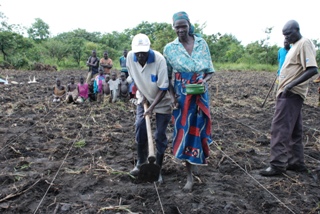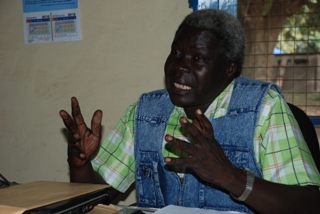FAO seeks to reduce S. Sudan’s dependency on imported seeds
By Julius N. Uma
September 15, 2011 (MOROBO) – The UN Food and Agricultural Organization (FAO) has embarked on a strategy aimed at reducing farmers’ dependency on imported seeds in South Sudan, as part of the new country’s drive to enhance food security among its population.

While speaking to journalists on Wednesday, Edmond Taban, the assistant commissioner in the Central Equatoria state ministry of agriculture and forestry reiterated government’s commitment towards boosting agriculture, which he described as the backbone of rural economies.
Nearly 80 percent of the southern population still heavily relies on – mainly – subsistence agriculture. Also, long decades of civil war disrupted agriculture, with massive decline in food production at household levels.
But according to the assistant commissioner, plans are underway by government, with support from development partners, to ensure that every household produces between 1-3 fedans of food.
A fedan is an agricultural term often used in reference a measurement of 60×70 square metres of farmland.
“Generally, we recorded [a] good harvest this year despite the numerous challenges faced by farmers. But with support from our partners like FAO, we are on course for [an] increase in agricultural productivity,” he told journalists in Yei county, Central Equatoria state.

“This [involving extension workers] is an expensive venture. We need more incentives to encourage more of these extension workers,” he appealed.
According to Joseph Okidi, a FAO official, the seed multiplication project initiated by the organisation mainly involves three different components. This includes, the breeder seeds, basic and certified seeds.
This year alone, FAO’s emergency unit has reportedly distributed about 2,400 metric tons of assorted seeds throughout the 10 states of South Sudan. Interestingly, however, South Sudan’s dependency on imported seeds has reportedly reduced tremendously.
“In 2005, nearly 80 percent of seeds planted in South Sudan were imported from Uganda, but later reduced to 73 percent in 2009. Last year, 55 percent of seeds used for agricultural activities were locally produced from within South Sudan,” Okidi revealed.
Ever since the community-based seed distribution and recollection activities were initiated, he added, farmers in South Sudan have been locally empowered in line with the organisation’s efforts to reduce dependency on imported seeds.
The FAO, Okidi said, will soon introduce seed storage cocoons, a facility that preserves seeds by reducing oxygen and increasing carbon dioxide in order to protect these seeds. Each cocoon is reportedly capable of storing up to 100 tons of seeds.
“Seed storage is an important element in the preservation of crop seeds to maintain its quality and purity,” he said, adding that the organisation also intends to build permanent food storage structures across the 10 South Sudan states.
Meanwhile, poor infrastructure, inadequate capital, lack of skilled expertise and few tractors have been cited as major challenges towards efforts by both the government and its development partners to boost the much-hyped food security plan.
(ST)
